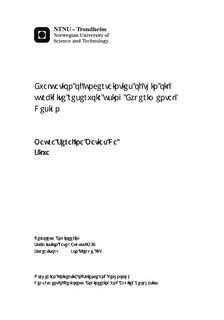Evaluation of uncertainties of thin oil turbidite reservoir using Experimental Design
Master thesis
Permanent lenke
http://hdl.handle.net/11250/2350960Utgivelsesdato
2014Metadata
Vis full innførselSamlinger
Sammendrag
This thesis concludes the degree of Master in Reservoir Engineering at the NTNU. The thesis was conducted in collaboration with Maersk Oil Company in order to provide to the intern valuable experience by using the reservoir simulator Eclipse and the software Petrel, commonly applied in the oil industry. The report describes an application of different studies performed in a real thin oil rim reservoir. It is oil with gas cap field located in the west of Africa. The reservoir consists of various channels, which divide it into several compartments with different heterogeneity and fluids oil contacts. In order to gain flexibility and ease testing all studies were conducted in a sector model, consisting of the main compartment of the field.The main goal of this thesis was to evaluate the uncertainties of the reservoir discovery using experimental design. In this study the key uncertain parameters were relative permeability, horizontal permeability and rock compressibility. A secondary objective was relate with coning study, where the main objective was to estimate the critical oil production rate through analytical correlations and numerical simulation, using available reservoir modeling tools. The greatest challenge was obtaining a LGR resolution model with acceptable resolution and CPU time, intending to improve simulation accuracy on the well bore region and to best capture the cone. The process was time consuming and tedious but leaded to satisfactory results. Finally, the report also describes three development schemes with water and gas injection producing under critical oil rate, where the scenario with both gas and water injection shows to be the most favorable scenario with 26% of oil recovered, and a coherent solution to handle gas.
